If you’re here on Tor.com, you’ve probably read some of Bradbury’s work. Scratch that. If you’re breathing and attended school in the last 50 years you’ve probably read some of Bradbury’s work. But, as most of us can attest, a classroom setting isn’t always the best place to truly connect with literature. Sometimes being “taught” a book, poem, or story, can strip it of its soul. Perhaps you did fall in love with Bradbury’s words when you first met, but then puberty and college and jobs, and the Mad Men marathon you did that one weekend, all got in the way. Well, it’s about time you reconnected with some of the world’s finest storytelling—not just in science fiction, but across all genres.
My first introduction to Ray Bradbury’s work did indeed come in a classroom, though not through the curriculum staple Fahrenheit 451. Instead, I met Bradbury in “There Will Come Soft Rains,” assigned by a desperate substitute teacher attempting to keep my 7th grade English class from spiraling into Lord of the Flies-like chaos. The story enthralled me: the quiet horror, the subtle way the mystery unfolds, the image of tiny robot mice with “pink electric eyes”—it was like nothing I’d ever encountered and I wanted more. Not long after, my dad brought home a copy of The Martian Chronicles for me to read. When I devoured that (probably in a single evening), he tried to satiate me with a huge collection of Bradbury’s short stories. I consumed it with a single-minded voraciousness that only kids seem to possess.
My dad (also an avid reader) was probably just grateful that I hadn’t descended into the wilds of a certain Sweet Valley popular at the time, but having a Bradbury enabler made all the difference to me as a reader. It even shaped who I would become as an adult, an idea that Bradbury himself touched on in his foreword for The Best American Nonrequired Reading 2012: “Think of everything you have ever read, everything you have ever learned from holding a book in your hands and how that knowledge shaped you and made you who you are today.”
So today, I hope to be a Bradbury enabler too. Though it’s difficult to pick favorites from the hundreds of stories he wrote, I think these five offer an excellent entry point. If you’re already a fan of Bradbury’s short fiction, I hope (re)reading these will inspire you to share a few of the stories that helped shape you in the comments below.
“There Will Come Soft Rains” (1950) available in The Martian Chronicles
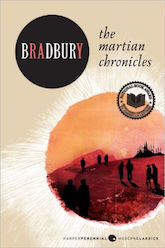
“At ten o’clock the house began to die.”
The title comes from a Sara Teasdale poem of the same name, which is featured within the story itself. The poem and the story contemplate life after mankind has perished. In the story, Bradbury’s house of the future carries on with its daily tasks and machinations, ignorant that its human inhabitants are missing. Burned into this story, like the silhouettes on the side of the house, is the emotional aftermath of Hiroshima and Nagasaki. It deftly reflects how the advent of atomic bombs would leave warfare and humanity forever altered.
“The Fog Horn” (1951) available in The Golden Apples of the Sun
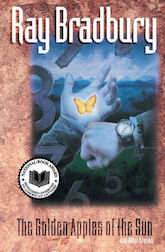
“The Fog Horn blew.
And the monster answered.”
A seasoned lighthouse keeper “onboards” the new guy, attempting to prepare him for some of the job’s more unique “challenges.” It does not go well. As much about broken hearts, longing, and loneliness, as it is about sea monsters, “The Fog Horn” explores the collision of the modern world with ancient instinct. “The Fog Horn” was originally published in The Saturday Evening Post as “The Beast from 20,000 Fathoms,” and was the basis for a film of the same name.
“The Night” (1946) available in The Stories of Ray Bradbury
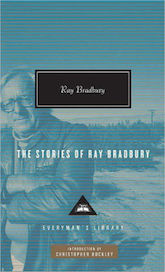
“Here and now, down there in that pit of jungled blackness is suddenly all the evil you will ever know. Evil you will never understand.”
Bradbury often drew inspiration from poetry, which is evident throughout his work. But for me, the poetry inherent in his prose is particularly vibrant in “The Night,” which includes one of my favorite sentences in all literature: “The town is so quiet and far off, you can only hear the crickets sounding in the spaces beyond the hot indigo trees that hold back the stars.” In “The Night,” Bradbury puts the reader in the shoes of a young boy, confronting true fear for the first time in his life. It’s more than concern for his missing brother, or being afraid of the dark as he and his mother search for him—it’s the deep bottomless fear of realizing one’s own mortality, and the vast loneliness that accompanies that realization.
“I Sing the Body Electric” (1969) available in I Sing the Body Electric and Other Stories
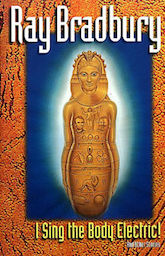
“Clever beyond clever, human beyond human, warm beyond warm, love beyond love…”
Initially published as “The Beautiful One is Here,” “I Sing the Body Electric!” draws its title from a Walt Whitman poem that examines the connection between the human body and the soul. In the story, a trio of siblings, grieving the recent loss of their mother, builds the perfect robotic grandmother to care for them. “I Sing the Body Electric” was originally a teleplay written by Bradbury for the 100th episode of The Twilight Zone in 1962. It was his only script to be produced for the show.
“The Lake” (1944) available in The October Country
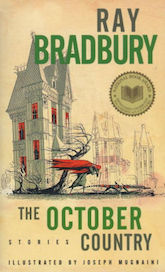
“Water is like a magician. Sawing you in half.”
Like a lake, there’s more to this story than initially meets the eye. On the surface, it is a classic ghost story—a young man, revisiting the scene of a tragic accident makes an unexpected discovery. But beneath that, like so many of Bradbury’s stories, it is about teetering on the edge of childhood—moments from falling, leaping, or flying, into the unknown abyss of adult life. “The Lake” was also adapted into an episode of “The Ray Bradbury Theater.”
Originally published in June 2013.
When Nancy Lambert doesn’t have her nose buried in a book, she’s busy writing, cutting down restless draugrs in Skyrim, or putzing around online.











Came for “The Fog Horn” and “Kaleidoscope”, was half-satisfied.
The Pedestrian was my first Bradbury story and it was one of the best things I was ever made to read in school.
All great recommendations. Another Bradbury story I only recently discovered thanks to the (wonderful) Levar Burton Reads podcast: “The Great Wide World Over There,” a moving and frequently funny tribute to the power of reading.
I started reading Bradbury with Fahrenheit 451 as a fifth grader, then moved on to The Martian Chronicles. The first one in that collection, “Ylla,” has always stuck with me – which is weird, it being a tale about cross-species infidelity. But beautifully told.
I always liked “The October Game” – very subtle and powerful, and with an ending left up to the reader to interpret.
Question – as someone who has only read F-451 but loves poetry and sci-fi and realised I should probably try reading some Bradbury shorts…what’s a good collection to start off with, if I’m going to purchase just one book for now? Thanks :)
@5: The Illustrated Man.
I thought of “The Fog Horn” last night when I was watching a video about the 52HZ whale whose unanswered mating call has been heard for years. Sad.
I was going to mention “The Emissary” about a sickly boy whose dog brings the outside world to him every night in his fur, but when I did a search to find the title, I discovered that the ending was totally different from my memory. A possible zombie is much less interesting than Death, itself. So, never mind.
I remember “There Will Come Soft Rains” from middle-school reading books, and it shook me to my core, but the two stories that locked Bradbury into my brain were “All Summer in a Day” and “Dark They Were, and Golden-Eyed”, both of which I found in SF short story collections.
@7 There are two versions of “The Emissary,” I actually just learned that today while glimpsing at new Czech edition of “The Dark carnival”. Didn’t read it yet, but I remember the “possible zombie” version.
I first read Martian Chronicle when I was ten, and most of Bradbury’s short stories are like old friends to me. But just recently I discovered “Death is a lonely business.” Not a short story, not sci-fi, but I love it. I’d name a few favourite short stories, but I don’t know their English titles.
So… my favourites from Martians Chronicle are: “…And the Moon be Still as Bright”, “The Green Morning”, “Night Meeting” and “The Million-Year Picnic”. These four make me tear up every single time I reread them.
And then there is “Frost and Fire.” I read it while I was supposed to be studying for some pretty important math exam, but I found myself so consumed by the story that I never managed to emerge and I just couldn’t go back to numbers after that. And I didn’t even care.
I’d think of more, but that could easily become “the list of all Bradbury’s short stories.”
My introduction to Bradbury also came in a 7th grade English class, only the story we read was “The Veldt” (accompanied by the really eerie 1989 Canadian TV adaptation). It’s still my favorite of his stories, and I think it might be why to this day I have an existential fear of smartphones :D
@5 The Everyman’s Library edition of “The Stories of Ray Bradbury” (2010). A comprehensive collection of 100 of his best (and a beautiful book to boot).
“The Homecoming” is probably the first Bradbury story I ever read, and it is probably still my favorite.
My first introduction to Bradbury was The Martian Chronicles, which is a fine place to start. And my all time favorite is the book Dandelion Wine, a novel that was actually stitched together from earlier short stories, including “The Night,” which is mentioned above. There is no bad place to start with Bradbury; all his work is magical.
Even though my mom was a big sci fi fan and had several Bradbury books, the first story I ever read myself was “All Summer in a Day” in 6th grade, where our teacher had us write a scene describing what might have happened next. That story stuck with me for years.
“Dark They Were and Golden-eyed” will always be my first thought when one mentions Bradbury. Two others that follow quickly are “The Thing at the Top of the Stairs” for a perfect build of suspense, and “The Watchful Poker Chip of H. Matisse” for those who think Bradbury couldn’t write pure absurdity.
-on edit, I find I listed these same three stories 5 years ago the last time Bradbury short stories came up on Tor. Maybe this will give me incentive to re-read some of his others I’ve forgotten.
I am pretty sure my first exposure to Bradbury (although it was actually years later that I realized this story was in fact a Bradbury story) was All Summer In a Day in seventh grade, which struck me to my core. Seventh grade was probably the nadir of my social life and when I experienced the worst of the bullying I experienced and everything about that story rung true.
I also loved Usher II (being a big Poe fan) and A Sound of Thunder (while kind of cliche now, I guess) was probably my first introduction to chaos theory/time travel tropes.
But I pretty much love all of the Martian Chronicles, and I think Bradbury is one of my very favorite writers in terms of prose and language. The imagery and even the cadence of the way he arranges his sentences is just so evocative.
From THE OCTOBER COUNTRY:
“The Homecoming,” which I have always loved, and “Skeleton,” which seriously freaked me out as a kid.
One of our fellow residents in the town of West Chester PA in my youth was an old actor named Claude Rains. I always read that title as “There Will Come Claude Rains.”
Sadly, Mr. Rains was a bit of a recluse; you never saw him.
It’s probably 50 years since I read them, but I remember clearly every one of the stories mentioned in the article, and most of those mentioned in the comments. I wonder if there’s a Complete Works of Ray Bradbury for the Kindle. (Ha! Bradbury Stories: 100 of His Most Celebrated Tales Kindle Edition, 924 pages for $12. It’s a start.)
It may be cliched, but for me the Bradbury story I return to (and recommend) most often is “A Sound of Thunder”. But I like most of what I have read by him – The Fog-horn is another favourite (and probably the first Bradbury I ever read).
I just love the way he uses language – on many occasions he uses a word in a context and I think “That isn’t the word I’d have used” and then I reflect a bit and admit “but it works better”.
He even wrote a children’s book–Switch on the Night which I loved.
Not “All Summer in a Day”? So many of his stories are about the simple and unthinking tragedies that people can inflict on one another — often children — and this one just takes the cake.
I think it was “The Sound of Summer Running” in a school reader that set me on the path.
The Foghorn still makes me cry. My brother recorded it for a high school presentation, and later passed the cassette on to me. I think I must have been eight or nine. More than thirty years later, I still love that story, and it still breaks my heart.
A year or so later, I discovered the Illustrated Man, which is still my favorite Bradbury collection, although The Veldt absolutely terrified me! (shudder) Bradbury does not idealize children.
Two more of my favorites, also from that collection, are The Fire Balloons, which contains some incredibly gorgeous language, and The Last Night of the World, piercingly sweet and sad.
Bradbury can do it all; beautiful, terrible, sad, joyous, sometimes outrageously funny. I have rarely encountered an author who is both so prolific and so evocative.
And while I’ve read and enjoyed quite a bit of his work, there’s still at least as much I have yet to discover. After reading this article, I may do that sooner rather than later. (smile.
Of all Ray Bradbury’s short stories I am most glad to have found ‘The Emissary’. Another unusual and disturbing story of his that I like is ‘The Small Assassin’.
Hi. I am struggling to remember if it is even a Bradbury story – something about a man in a hospital with his skin crusting up where the doctors have no idea what is going on, then his vitals stabilize and by all appearances he is perfectly normal and walks out of the hospital to look up at the sky and fly away
I am reading Dandelion Wine and it seems like a bunch of short stories connected within a larger story. One chapter haunted me though because I’m sure I read it many years ago in either elementary school or middle school. The chapter where three women go to the movies one night and one has to walk home alone. There is a serial killer around and as she walked home she feels like someone is following her and she gets home but before she can turn on the lights she hears someone clear their throat, and the story ends. It stuck with me until this day when I read it in this book. I thought it was written by someone else but since that was nearly 40 years ago I could be wrong. Any thoughts?
Hi there, just heard on the BBC sounds app, the day it rained forever by ray bradbury. and all i can say is magic! from start to finish i was enthralled. i must admit i was overcome with emotion.something i’ve noticed i do more and more as i get older! with the storyline and in particular the music of the harp.i would recommend a listen.